TACC
OTW Pre-Apprentices at Habitat for Community Build Day
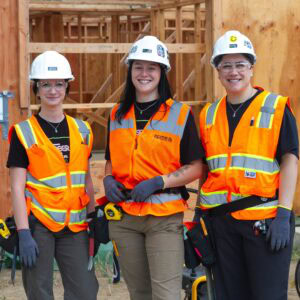
This September, three Oregon Tradeswomen pre-apprentices from the Summer 2025 TACC cohort were given the opportunity to participate in a Community Build Day at Habitat for Humanity‘s Myrtlewood Way job-site in Gresham alongside pre-apprentices from Constructing Hope. This Community Build Day was hosted by our friends at Danner Boots with the goal of highlighting young tradesworkers, also known as “the Toolbelt Generation,” in hopes of inspiring Gen-Z and Gen-Alpha youth to consider careers in the skilled trades. Skilled trades careers offer high wages and many diverse career pathways that are accessible to anyone ready to work hard, as well as high levels of career satisfaction.
Our pre-apprentices Ella, Jess, and Bre spent the day working shoulder-to-shoulder with skilled Habitat tradesworkers in addition to other pre-apprentices, learning new carpentry techniques and building upon the foundation that they have formed throughout their time in the TACC program. This experience gave these three students a taste of what their future could look like, building their communities alongside a solid team of tradesworkers, and left them excited for what is to come after they complete their pre-apprenticeship.

There are many opportunities to get involved and develop your building skills like our three pre-apprentices did. If you are looking to skill-up while contributing your time to a great cause, Habitat for Humanity is looking for more volunteers for the Myrtlewood job-site. Learn more about volunteering with Habitat here!
Statewide Expansion Reaches Lane County
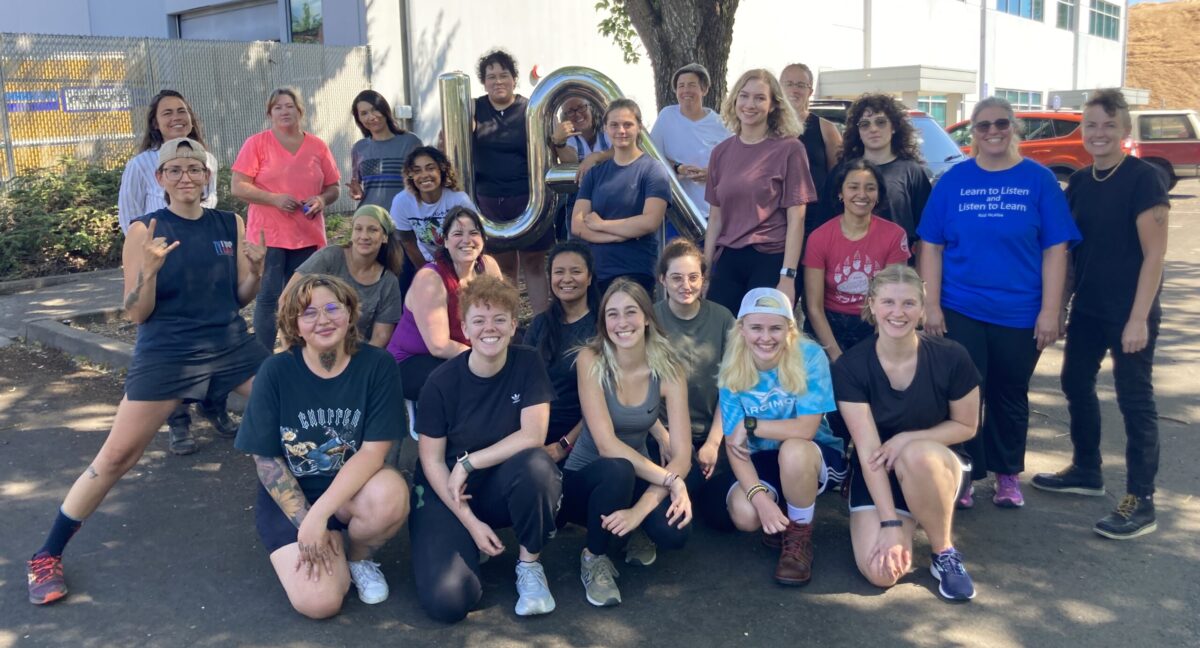
Oregon Tradeswomen continues to expand our pre-apprenticeship training opportunity for women to new communities in Oregon. Our incredible team, and a host of industry partners and supporters, worked hard to bring our Trades and Apprenticeship Career Class (TACC) to Lane County this summer. It’s our largest cohort of students outside of the Portland Metro area so far!
Excited doesn’t even begin to capture our feelings about offering our BOLI-certified pre-apprenticeship training program to even more women and gender minorities across the state of Oregon. Over the 8-weeks of training, these students will be hard at work preparing to take the next step into registered Apprenticeship and a career in the skilled trades!
This new venture would not be possible without the dedication and support of our many partners who helped us get here. Huge gratitude to UA Local 290, for our ongoing partnership, and for hosting our Summer TACC at their state-of-the-art training center in Springfield, Oregon. This cohort of pre-apprentices have a wonderful facility to build a strong foundation of skills and knowledge necessary to succeed in their chosen career in construction.
Oregon Tradeswomen was also thrilled to work with Terry Bierwirth of Second Story Marketing Group to get the word out about our first Lane County training opportunity. Our team first met Terry many years ago as part of her Skilled to Work campaign on KEZI in Eugene. With Second Story Marketing Group as our partner, we were able to recruit the most students we’ve ever had in a statewide pre-apprenticeship offering!
We extend our most sincere thanks to:
Area III Plumbers JATC
Balanced Electric Inc.
Chambers Construction
Connected Lane County
Eugene Builders Exchange
Independent Electrical Contractors Oregon
Lane Education Service District
Lane Workforce Partnership
NAWIC Eugene Chapter #77
Opportunity Oregon
Oregon Employment Department
Pacific Northwest Carpenters Institute
Sheet Metal Institute
Springfield Chamber of Commerce
UA Local 290 College of Mechanical Systems & Technology
WorkSource Oregon Lane
Each of these organizations helped share information about Oregon Tradeswomen’s TAC Class with their networks and community, and a sound reminder of how our collective efforts around a common goal can achieve great things, and that together, we are moving the construction industry into a bright future.
We can’t wait to see the Summer cohort of pre-apprentices develop into skilled tradesworkers who will be building across Oregon!
Oregon Tradeswomen’s Summer Night and Weekend Training
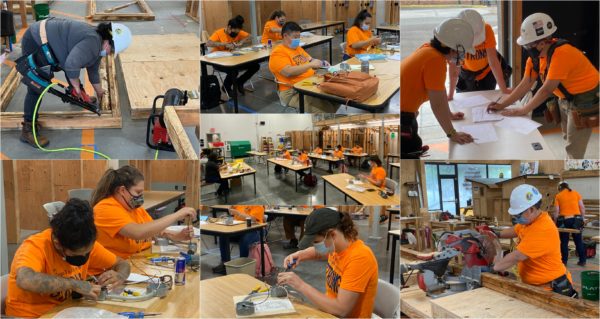
Oregon Tradeswomen recognizes the need to provide options to working women to participate in our programs. Many of our Trades and Apprenticeship Career Class (TACC) pre-apprentices are not only juggling family demands, but working while attending the program. In fact, many join while employed full time and have to give up employment in order to attend. To help these students achieve their career goals while financially sustaining their families, Oregon Tradeswomen responded by offering a night and weekend TACC class this Summer.
Here are some of the participants’ accomplishments observed so far, thanks to the alternative night and weekend schedule:
- Two TACC participants work full-time jobs during the day and are committed to graduate while preparing for IBEW’s Electrical Apprenticeship.
- A third student is working full-time as a teacher aid while caring for a newborn and a toddler while attending TACC.
- Another participant is able to work part-time, care for her kids, and thanks to the current schedule, her husband can watch the kids in the evenings.
- We also have a participant who is a full-time mom, and is able to leave her kids with their dad in the evenings so that she can attend classes.
Oregon Tradeswomen is able to be responsive to jobseeker needs, and shift our programming with the valuable collaboration of industry partners and we will continue to make our program more accessible. Look for additional evening and weekend classes in 2022!
Graduate Success Story: Jamie Jarrett
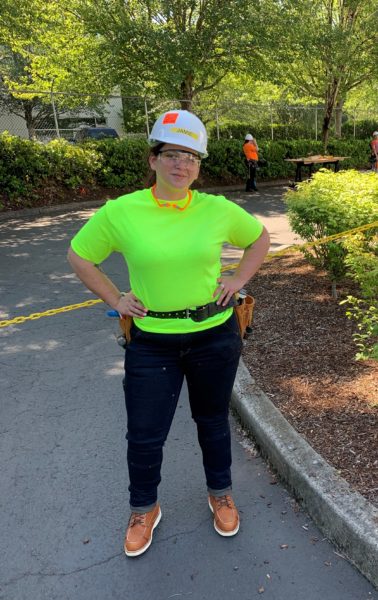
In 2019, Jamie Jarrett came to Oregon Tradeswomen with a tenacious drive to change her life. Having grown up in a cycle of poverty without a strong support system, Jamie found herself battling drug addiction and had to do whatever she could to make ends meet to survive. From working in a strip club, to managing a fast-food kitchen, the opportunities available to her did not provide the long-term stability she needed to live a happy, healthy life.
Despite the barriers she faced, Jamie’s determination to overcome adversity was a key asset as she evaluated what she needed to do to secure a bright future for herself. She originally found out about Oregon Tradeswomen (OTW) from her fiancé, a union carpenter who had worked with an OTW graduate in the field. It wasn’t until a miserable day at work that Jamie seriously considered pursuing a career in construction. With fire in her belly, Jamie did everything she could to get involved with Oregon Tradeswomen, attending events, social hours, and information sessions until she was selected for the Fall Trades and Apprenticeship Career Class of 2019.
Joining this training cohort offered Jamie a positive community of women that fostered friendliness and support. Jamie told us, “I have never experienced an environment like this before where women were helping each other instead of fighting to get ahead.” This support system did not end with the 8-week program. Being the only woman on a job-site can sometimes be isolating, but having a network of women who are going through similar experiences is a truly invaluable resource.
When Jamie finished her 8 weeks of pre-apprenticeship training, she set her sights on the electrical trade because of her enjoyment of science and math. Jamie also got involved with various Facebook groups for electrical apprentices and female electricians to get a better idea of what the work would be like. When she saw photos of huge substations and carefully bent conduit, her excitement for the trade intensified. “If I was to go and learn something new, I knew I wanted to bend pipe and make an electrical room look like what I saw online. There is something aesthetically pleasing about electrical work,” Jamie explained.
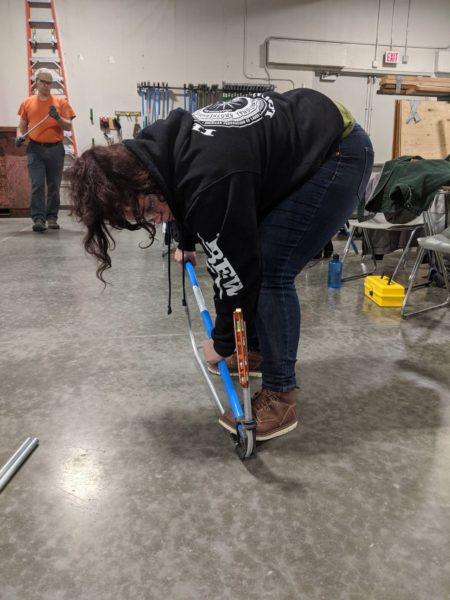
Jamie is now a 4th term electrical apprentice at the NECA-IBEW Electrical Training Center where she now goes to work every day looking forward to learning new things and putting them in practice. Not only does she love her job, but she has broken through the cycle of poverty. Jamie shared with us that, “In the trades, I know I can be on my own and be okay. I know I have food to eat every day, I have an apartment to go home to every night, and I have health insurance for the first time in my entire life.” The newfound security and comfort in her life, both financially and mentally, also allows her to take time off to visit places she has always wanted to see. She also stresses that “I never thought five years ago that I would be here and working towards a career that is good for my whole life, that nobody can take away from me. No matter what I go through in my life, I will always have this.”
When we asked Jamie about what motivates her to keep going on the hard days, she said that the progress she has made since she took her first steps at Oregon Tradeswomen just about two years ago is what inspires her. In those two years, her life took a total 180 degrees all on her own merit. “I have achieved so much,” Jamie says. “So far I have completed three terms of schooling and have gotten straight A’s. The fact that I want to go to school and learn feels so good!” Jamie proved to herself that she can accomplish anything she sets her mind to and that is a power in of itself.
Jamie’s optimism about the future is undeniable. Her goal is to give back to the next generation of tradeswomen by becoming an instructor at the NECA-IBEW Electrical Training Center, but for the time being she is truly enjoying her day-to-day as an electrician. Her love of the work and the stability it affords prompts Jamie to help other women navigate to a career in the trades. She is open about her own journey and how getting involved with Oregon Tradeswomen changed her life. When asked why someone should support Oregon Tradeswomen, she says, “They give chances to people that might not ever have had any. If Oregon Tradeswomen didn’t take a chance on me, I wouldn’t be where I am today.”

Its stories like Jamie’s that keeps our mission moving forwards. When we hear Jamie say, “my biggest achievement is learning who I am supposed to be,” and that “being in the construction world has been that piece that I was missing,” we know we are making a concrete impact on people’s lives. Everyone deserves to have a career that they love, and everyone deserves to have a prevailing wage with generous benefits.
Oregon Tradeswomen is proud to be a part of Jamie’s success story, but it was her perseverance that got her to where she is today.
Liz “Knuckles” Nichols the Cement Mason

Liz Nichols grew up in Massachusetts, and like so many teenagers, she received the clear message that her next step after high school was to go to college and get a degree.
Liz started college in 2002 and achieving that college degree was no easy feat. College itself was challenging for Liz. She told us, “I was just a mediocre student. I had ADD and a learning disability and getting through college was a struggle.”
But Liz persevered and in 2006, earned her bachelor’s degree in English.
The next steps were not so clear, but the next challenge was in front of her: finding living wage work, paying off college debt, and building her future.
Liz shared that she “had a bit of a crisis of confidence. I got the degree, but it was still a struggle to earn a living wage.” Liz added, “After going through college telling myself, ‘just get through this, and everything will be okay…’ it did a number on my self-esteem because I wasn’t okay – it was still a struggle to earn a living wage.”
Liz moved to Portland and found employment working gardening and landscaping jobs in the spring, summer, and fall, and working at coffee shops in the winter. Her situation was unfortunately common – Liz had her college degree, but was in debt, earning low wages, and receiving no health or retirement benefits at either job.
While working the landscaping jobs, Liz discovered she really enjoyed working outdoors and doing physical work, and it was during a conversation with a customer at the coffee shop in the winter of 2013, when Liz made the connection that she could have the best of both worlds with a career in the trades: living wages and a physical job, not behind a desk. “One day while chatting with an IBEW electrician, I learned about Oregon Tradeswomen’s pre-apprenticeship program. I applied immediately. Liz continued working as a barista until class started. It was meant to be, as Liz almost didn’t get into that class. She said, “I was on the waiting list and lucky for me, someone dropped out!”
Liz loved Oregon Tradeswomen’s pre-apprenticeship class. “I knew immediately I wanted to go the union route.” Liz was drawn to the debt-free career training, the pay, healthcare, retirement benefits, and stability.
Liz said she started TACC with a bit of ’imposter syndrome’, or “who am I to think I can go down this path?” But what she heard from Oregon Tradeswomen instructors throughout the class: “You’re here because you don’t have experience. You will get on the job training and that’s okay – that’s expected.”
Liz started a one-week class with the Cement Masons right after graduating from TACC. On Wednesday after class, Liz was asked to stay late, where she was offered entry into the apprenticeship program starting the following week! She called Oregon Tradeswomen immediately, very excited and slightly unsure. Liz LOVED the work, but wasn’t completely sure she should go for it so quickly? She trusted her instinct and joined Cement Masons Local 555 and is so happy she did.

“My Union has been wonderful.” Partway through her apprenticeship, her father-in-law was diagnosed with a terminal illness and Liz and her husband packed up their home in Portland within a week, were moving back to Massachusetts. “It was intense but being in a union saved me!” Liz had virtually no gap in her apprenticeship training – she picked up the next week after arriving in Boston. “There were fewer women on jobsites when I was working in Boston, but I was glad to be able to continue my apprenticeship training without missing a beat”. When she moved back to Portland, it was seamless again.
During much of her last year of apprenticeship, Liz was pregnant, and she worked up to 3 weeks before her due date working concrete! Four months later, Liz was ready to take her journeyman exam. On the scheduled day, she couldn’t secure childcare and brought her young son with her and her instructor and Business Manager babysat while Liz took her journeyman exam! Liz reflected warmly on that day and said, “I felt very supported throughout my apprenticeship there.”
When we asked about any challenges Liz had along the way, Liz shared that most of her male coworkers have been supportive, “there were a few who tried to talk me out of the trade, encouraging me to go to an ‘easier trade’ – to go push a broom or become a flagger.”
Liz also shared that there are not yet any formal structures in place for parental leave – or nursing mothers. “I nursed for 20 months, but there were no facilities on the jobsite, so I was discreetly pumping and dumping breast-milk into a porta-potty. I was still able to nurse son though.”
Today, Liz is loving her work as a journeyman cement mason, and a recent competitor on the CBS television show Tough as Nails! Oregon Tradeswomen was contacted last year by the show’s producers, and we shared the information on social media. Liz told us, “I saw the post on Instagram and went to the website. I filled out the form and sent photos of myself on the job. A few weeks later, I was contacted to participate on the show in LA!”
Liz couldn’t share much about the show, as it was airing at the time of this interview, but she did share that one of the things she loved most was seeing the other undeniably amazing women. “It makes me so happy that the show offers such a physical representation of strong women – increasing visibility in places where there aren’t as many women doing physical work.”
Liz loves the work she does! She told us: “Concrete is like alchemy! It’s challenging work that’s different everyday and I love that you get a final product so immediately. Every time I leave the job site there is something new there that will probably outlast me.”
Redmond Rural Training Project
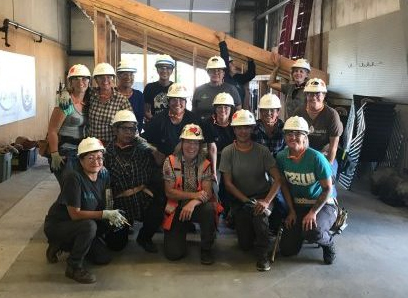
Given the significant demand for diverse, skilled, and qualified construction workers in the area to meet industry labor demands, Oregon Tradeswomen piloted our apprenticeship – readiness-training program, Trades and Apprenticeship Career Class (TACC) in Redmond, Oregon in September 2019. The pilot training was made possible by generous support from our union trades partners who provided critical support to make the class in Redmond a reality. From holding mock interviews, to providing hands-on instruction, to hosting graduation at UA Local 290 – our industry partners were involved to ensure the pilot was successful. Oregon Tradeswomen is grateful for their commitment to helping women gain access to great careers with good wages so they can support themselves and their families!
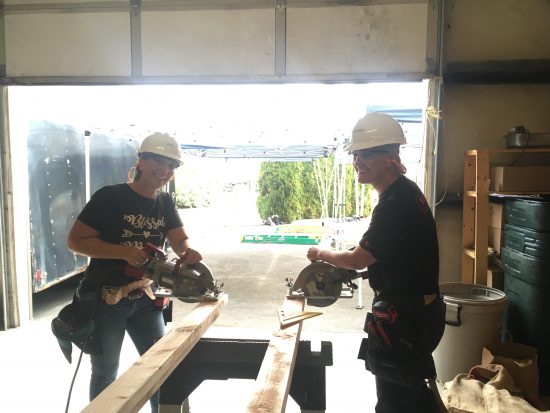
With financial support from North America’s Building Trades Unions in Washington, D.C. and local support from Robert Camarillo, Executive Secretary of the Oregon State Building and Construction Trades Council, Oregon Tradeswomen was able to work with regional industry and community partners in Central Oregon. In turn, our partners in Central Oregon were critical in helping to recruit jobseekers and connect to local employers: Heather Fitch and East Cascades Workforce Board, Wendell Jim at the Warm Springs Tribal Employment Resource Office, Rena Gibney of the Oregon Department of Human Services Self-Sufficiency Programs and Joe Mizzolo of WorkSource Redmond and our many friends at Central Oregon Community College for all of their support as well.
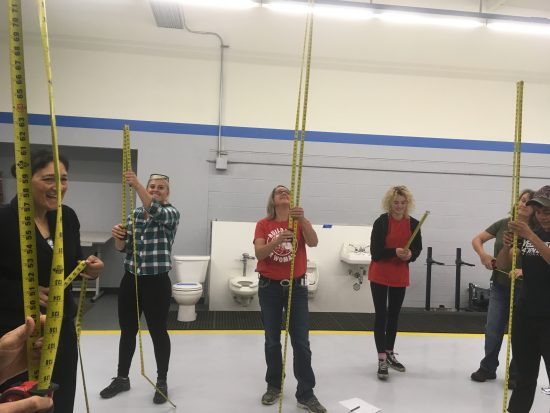
Thanks to our industry partners for lending their time, talent and support to this project:
- UA Local 290
- NECA IBEW Electrical Training Center and IBEW Local 48
- NECA IBEW Central Training Center and IBEW Local 280
- Oregon Laborers Apprenticeship & Training
- Cement Masons Apprenticeship Local 555
- Ironworkers Apprenticeship Local 29
- Roofers Apprenticeship Local 49
- Pacific Northwest Carpenters Training Institute
- IUOE Local 701 Apprenticeship
- Oregon Bricklayers and Allied Crafts
Oregon Tradeswomen also extends immense gratitude to our friend Dave Burger of UA Local 290. Dave went above and beyond to ensure this pilot training in Redmond was successful. He arrived early, stayed late, and offered tremendous support to our team as well as to jobseekers. Dave connected program participants to one another for transportation, support, helped refer women to the program, cooked food for program participants and staff, and demonstrated what an industry partner committed to diversity, equity, and inclusion looks like. Oregon Tradeswomen is eternally grateful.
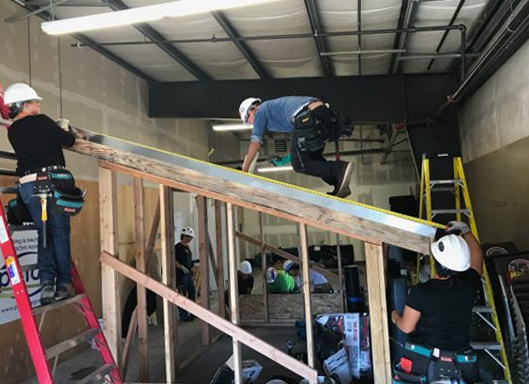
Fifteen program participants completed the apprenticeship readiness training program and received a pre-apprenticeship training certificate from the Oregon Bureau of Labor and Industries, demonstrating their competencies and achievement in being prepared for registered apprenticeship and employment in the skilled trades. Oregon Tradeswomen was honored to host Oregon’s Labor Commissioner Val Hoyle as our keynote speaker at the graduation ceremony. Commissioner Hoyle’s service to the great state of Oregon, and her commitment to equity and justice, made us proud to have her speak to the graduates and their families.
Congratulations to the TACC program graduates – we wish them all well on their journey forward!
- Wanda Berry
- Eva Brewer
- Kayla Burns
- Claudia (Paloma) Castro
- Laura (K.K) Crowe
- Audreanna (Audrey) De La Rosa
- Lianna Erwert
- Peggy Gilbert
- Susan Guerin
- Camille Hernandez
- Lara Martinez
- Damaris Monroy
- Kelli Moody
- Susan Mulkey
- Ryleigh Shiner
- Amelia Templeton
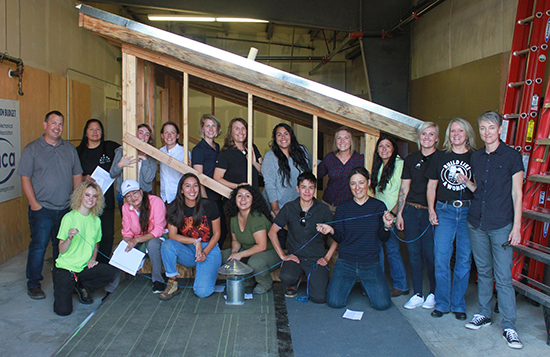
Tradeswoman and Mother Trillium Ward

No one said it was easy being a tradeswoman and a mom, but being a tradeswoman can give you the financial security to provide for your family. Trillium Ward began her journey into the skilled trades as a single mother of two, working as a drug and alcohol counselor for kids and young adults. Her job as a counselor was challenging work that only paid $12.50 an hour, hardly enough to support a family of three. Public assistance was helpful, but this was not the life Trillium imagined for herself. She had always loved working with her hands and took wood-shop, metal-shop, and other vocational programs her high school offered which focused on hands-on learning. With these experiences, the skilled trades started to look quite appealing as a new career option.
Trillium first applied to become an electrical apprentice with the IBEW, but didn’t score high enough on the application process to enter the program. After hearing about Oregon Tradeswomen around the community, she decided to enroll in the pre-apprenticeship program, the Trades and Apprenticeship Career Class (TACC). She knew that going through this program would be like receiving an endorsement of her qualifications and ability to succeed in the field. She was accepted to a special session of TACC that ran at night, which allowed her to continue working full time to support her family. If that wasn’t enough to demonstrate her commitment, she was also simultaneously taking a welding class on weekends!
After all her hard work in Oregon Tradeswomen’s pre-apprenticeship program, Trillium graduated from TACC, re-applied to the IBEW’s apprenticeship program, and was accepted! As an apprentice, she immediately made $3 more per hour than she did as a drug and alcohol counselor. Being a single mother at the time, it was imperative to have a support network of family and other moms to help out with childcare because a typical day for Trillium started at 4:00 am! Thankfully, just 6 months into her apprenticeship, Trillium made enough money to get off of state assistance and afford daycare. Her advice to mothers thinking about pursuing a career in the trades is to “make sure you have reliable daycare that can accommodate early mornings and the ability to be flexible with your schedule!”
Just 5 years after starting on this new path, Trillium journeyed out of the Electrical apprenticeship! This is an incredibly proud accomplishment for her, because she managed to meet all of the strict program requirements around attendance and grades, all while having a new baby with her partner. Trillium is currently working for Oregon Electric Group where she runs bus ducts, installs conduits, pulls wire, creates panels, and installs lights among – other things. Trillium loves how her work keeps her brain engaged – whether she is learning new technology, new skills, or being put in different situations requiring adaptation and problem-solving. The hardest part about her job is the lack of continuity. When the people you work with, your start time, and your commute change regularly, its hard to plan for the future.
The biggest barrier Trillium faces as a woman in the trades is not outright harassment, but that compared to the men on her crews, she is not taken seriously. As a result, she has to to above and beyond to prove herself on every job-site – otherwise the men frequently assume that she isn’t competent. This becomes exhausting when you’re changing job-sites regularly – having to prove your worth with a new crew each time. Trillium’s advice for other tradeswomen is to help support other women. Solidarity is important in this field, so when you see other women, reach out, because the isolation can be hard.
In the end, the hard work pays off. Trillium says, “The amount of change in my financial status, going from poverty and living paycheck to paycheck, to financial freedom where I can buy a home and go on vacation has made a world of difference in my life and my children’s lives.”
The Journey of a Female Locomotive Engineer

Huffing and puffing along, a 7,000 foot freight train curves gracefully around the Columbia River Gorge. Jessica Hassler, locomotive engineer extraordinaire with BNSF Railway, looks out the side-view mirror of the cab at the 16,000 tons she has been vigilantly guiding for hundreds of miles. She feels pride welling up inside her as she safely and smoothly handles the power of this great machine.
Jessica has been a Locomotive Engineer for 7 years now and has been with the railroad as a whole for 10 years. Before her foray into the world of locomotives, Jessica was a creative ‘jack-of-all-trades’. Armed with a Bachelor’s of Fine Arts in Illustration, she supported herself by doing freelance work. She was contracted by advertisers and restaurants to draw for them, but the work wasn’t conducive to ensuring a stable future; the market for creatives in Portland was, and continues to be, saturated. Jessica also opened up her own food truck, but after 3 years, decided that being an entrepreneur was not for her if she wanted to have job-security, health insurance, and to one day own a home.
She heard from a friend that BNSF Railway was looking for switchmen and conductors and that the work was well compensated and Union protected. In 2008, she took a chance and applied to BNSF Railway. She was hired as a switchman/conductor and worked for 6 months before getting furloughed. The furlough, while incredibly inconvenient, was a perfect segue into Oregon Tradeswomen’s Trades and Apprenticeship Career Class (TACC).
Jessica was at a loss as what to do until someone pointed her in the direction of Oregon Tradeswomen. Growing up in North Dakota, Jessica never considered the skilled trades or blue-collar work an option, as it was mostly men who filled those jobs, but going through Oregon Tradeswomen’s pre-apprenticeship training program, a whole new world opened up for her. During the summer of 2009 when Jessica was enrolled in TACC, she developed an interest in becoming a lineman with Bonneville Power Administration. One of the most valuable things she experienced during Oregon Tradeswomen’s class was the opportunity to learn math in a way that made sense to her. Jessica never saw math and numbers as things that came easily to her, but in TACC, math was broken down in a way that she could access. TACC was also a supportive environment where she felt like she could ask as many questions as she needed about anything.
Soon after graduation from TACC, BNSF ended Jessica’s furlough and she decided to go back and work as a switchman. Even though she didn’t go on to pursue the electrical trade, Jessica reflects on her time in the TACC program fondly, saying that: “Oregon Tradeswomen picked me up when I didn’t know what to do. It helped me realize that even if the railroad didn’t work out, there were other options in store for me.”
And so, it was “Take Two” for Jessica. Hired on as a switchman, she switched cars, serviced local industries, and built trains for departure to their next destinations. Working on the railroad can be a very challenging job. While not for everyone, it is a place for someone who thrives on variety. You are on the railroad’s whim as you are on-call 24/7 and Jessica says that it is up to you to make the best of worst of it. Jessica made the best of it and after three years working on the ground, she took the promotion to become a Locomotive Engineer.
Throughout her time at BNSF Railway, the men that she worked with were nothing but welcoming and genuinely thrilled to have a woman join the crew. When she just got hired on, she was fearful of harassment or hazing, but instead she felt respected by the men who were all so generous to teach and share their tips and tricks. The men on her crew understood that she was their teammate and that if she succeeds, they succeed. Jessica calls them the family of men she never expected to have. There is irony in how Jessica found support, success, and a sense of equality at the railroad, a place people don’t expect women to work. BNSF does have a very strict harassment policy, but Jessica recounts that in her case, the culture has been so positive that it never needed to be enforced. Even ten years ago things were much harder for women on the railroad, but since then, the culture has evolved for the better.
To the women who are curious about joining BNSF, Jessica Hassler says, “Just do it! Be open and be brave. Drop the attitude and the ego and go into it knowing nothing with nothing to prove. Believe you can do it and allow yourself to learn it.”
10 years with BNSF Railway has flown by for Jessica and she has all that she once dreamed of: a rewarding job that offers great benefits, belonging to thee BLET Union, owning a home, owning a car, and she has the economic stability she always dreamed about. She even met her life partner through her job with BNSF.
So what does the future look like? Jessica can see herself sticking with it for another 20 years followed by happy retirement. As long as she can sustain the lifestyle, there is no reason not to go all the way to retirement.
Life may not always end up how you thought it would, but sometimes the reality you end up with is even better than anything you could have imagined. It is important to take things in stride and keep your options open. Who knows, you might discover something life-changing like Jessica did!
Excitement Over Oregon Tradeswomen’s Annual Picnic and All Class Reunion!
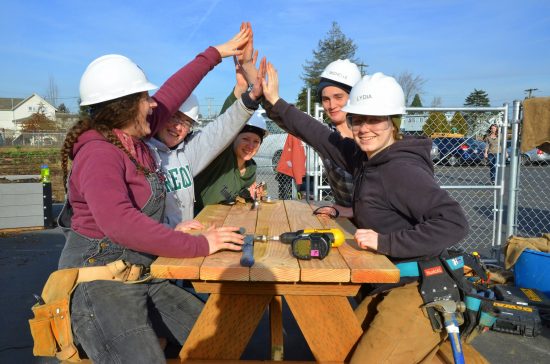
On Sunday, August 12, 2018, from 11:00 am – 2:00 pm, Oregon Tradeswomen is hosting our Annual Picnic at Creston Park in Southeast Portland, complete with food, games, camaraderie, and fun!
This year, the picnic will also serve as an all-class reunion where we hope to see dozens of tradeswomen who went through our Trades and Apprenticeship Career Class show up to represent! The class with the highest percentage of alum at the picnic will win a prize. There will be more opportunities for competition and prizes as we will be holding a cornhole contest where the top two winners will win a pair of Portland Thorns tickets!
We want to take a moment to shout out Las Primas, a fantastic woman-owned business, for catering our event with delectable Peruvian cuisine (We are so excited to indulge in their home-style churros)! An additional thank you goes out to IBEW’s Credit Union for preparing a picnic themed gift basket for the event!
The Annual Picnic is going to be a spectacular opportunity to come reconnect with classmates, network with tradeswomen, indulge in a splendid meal, and win prizes!
We hope to see you on Sunday, August 12th at Creston Park from 11:00 am to 2:00 pm!
Milwaukee Tools Lends a Hand to TACC
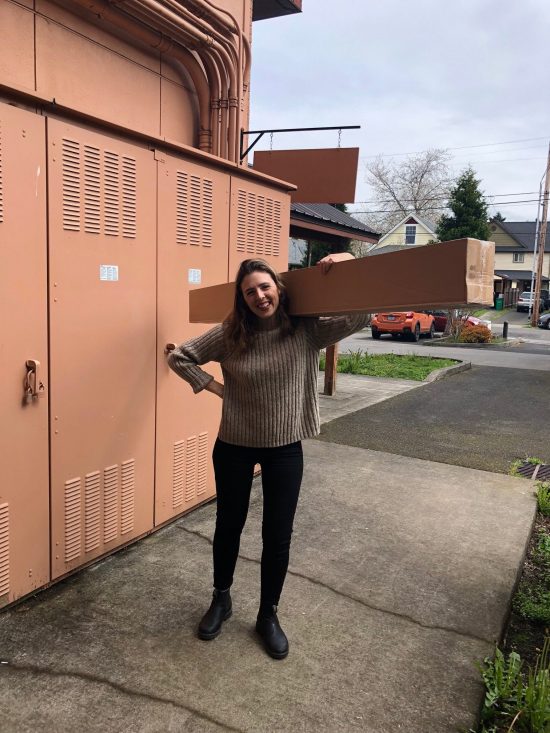
The power of social media is real. Some may see platforms such as Facebook, Twitter, and Instagram just as a way to share what you’re doing, what you’re eating, what you’re thinking, but it’s more than that. As an organization, we see social media as a way to share our mission, to inspire others, and to build relationships with not only with our individual followers, but with other organizations and companies. We are here to build a community with those who believe in empowering women, encouraging workforce diversity in the trades, and promoting visibility for apprenticeships among other core values… And build a community, we have.

We are so incredibly grateful for the wide variety of connections we have made through these social media channels. Late in 2017, we saw that little red “1” icon in the top right corner of our Instagram feed, signifying that someone send us a private message. The message read, “Hi! I’d like to get involved with your organization. Can you please point me in the right direction? Thank you!” Touched by the fact that someone went out of their way to reach out to us and express a desire to engage, we connected them to Lisa Palermo, our Development Director. Little did we know that this person worked for Milwaukee Tools, a distinguished power tool manufacturer from Wisconsin known for their innovation and high quality. As it turns out, the president of Milwaukee Tools had seen a post of ours on Instagram and was compelled to learn more about Oregon Tradeswomen and our mission. Wanting to support diversity in the industry as well as invest in the community, he tasked someone to make the connection with us.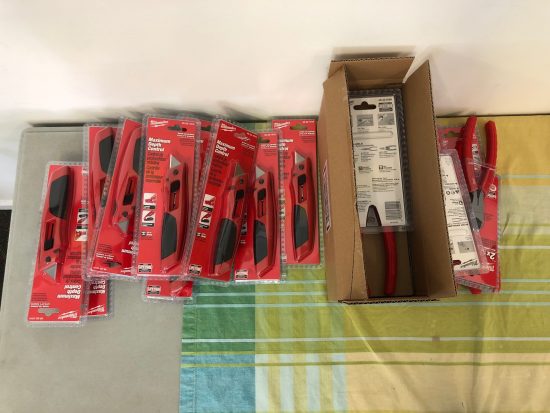
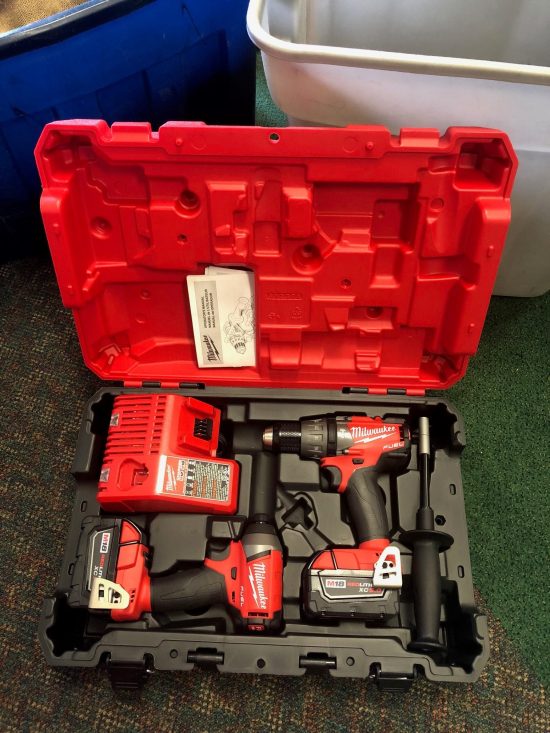
In supporting the work we do, Milwaukee Tools made the incredibly generous offer to outfit our pre-apprencticeship program, Trades and Apprenticeship Career Class (TACC), with brand new tools! TACC students have been using the same rusty, second-hand tools for far too long, so this gesture was graciously received. They donated enough tools to replace almost all of our older, dilapidated tools. It is so important that the women in our program have more than adequate equipment so they can really learn how to use tools without frustration due to malfunction or poor quality. We want our tradeswomen to be job-ready and it means the world to us that Milwaukee Tools wants to help our students have the best experience entering the trades possible. 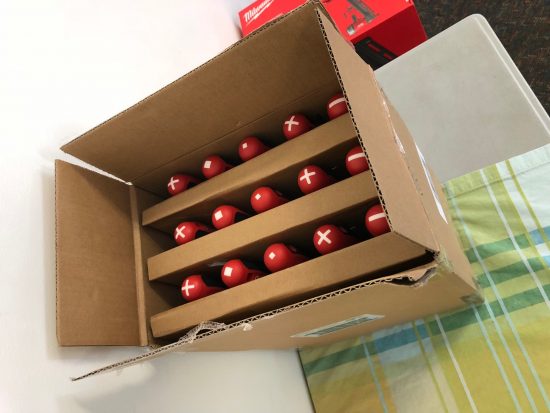
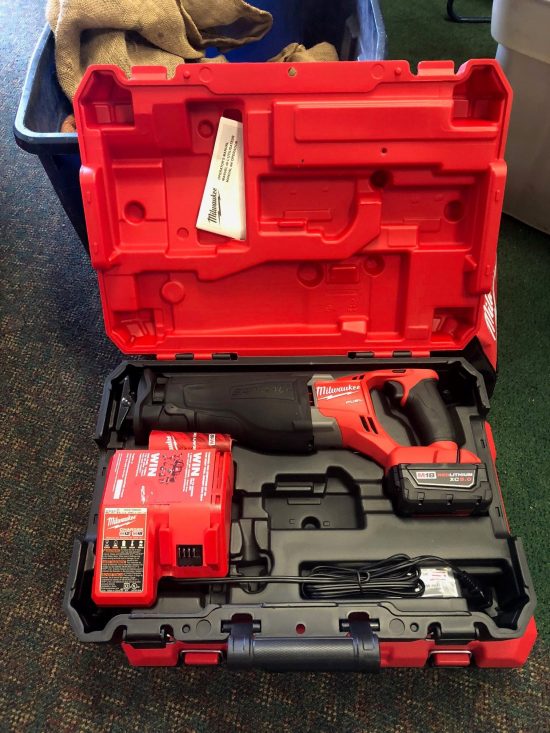
What started as a simple Instagram message blossomed into a truly special partnership. We are humbled by the fact that a highly reputable company intentionally sought us out to get involved and help us on our mission. We extend our deepest thanks to Milwaukee Tools for donating their high quality equipment to our pre-apprenticeship program, improving the experiences of the women who we are training to enter the workforce!
